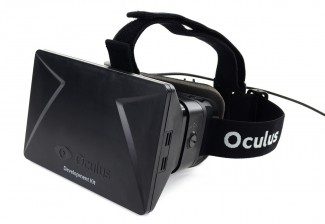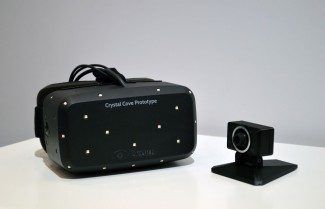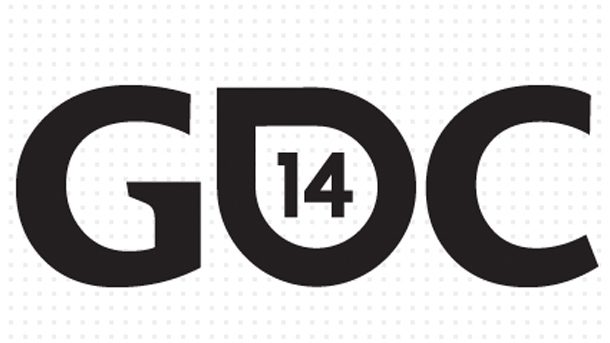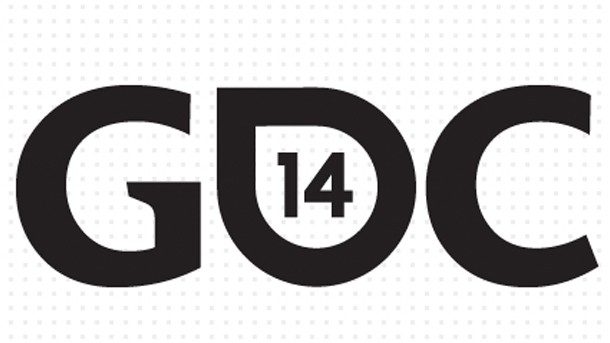The schedule for this year’s Game Developer Conference is online, and one talk scheduled to be given by Oculus VR may give attended a glimpse of what they can expect from the long awaited next-gen Oculus Rift Dev Kit (DK2).
The Road to DK2
 GDC has always been a great place to sniff out emergent games and technologies. It’s hard to believe it’s almost a year since Road to VR’s Ben Lang attended himself. It was at GDC 2013 that we got our first glimpse of the new 7″ Developer Kit in action and of course a world’s first demo of the legendary Tuscany Razer Hydra Demo – at the time a big story given that most Kickstarter backers had yet to even receive their Oculus Rift Dev Kits.
GDC has always been a great place to sniff out emergent games and technologies. It’s hard to believe it’s almost a year since Road to VR’s Ben Lang attended himself. It was at GDC 2013 that we got our first glimpse of the new 7″ Developer Kit in action and of course a world’s first demo of the legendary Tuscany Razer Hydra Demo – at the time a big story given that most Kickstarter backers had yet to even receive their Oculus Rift Dev Kits.
VR’s come a long way in 12 months. We’ve moved from glimpses of fledgling, prototype technologies to actively preparing for the arrival of the real thing. Steam Dev Days last month set the tone for 2014 and what many believe will be the year VR finally breaks free of its 90s legacy and into the public consciousness proper. At SDD, Valve threw its not inconsiderable weight squarely behind virtual reality and Steam OS as technologies that would define the next generation of gaming and developers lapped it up.
It seems that GDC 2014 is set to continue this trend as details of its schedule were announced recently. Of particular interest to VR fans are two talks being given by Oculus VR. The first is interesting enough. Entitled “Developing Virtual Reality Games and Experiences” it’s presented by Oculus VR Software Architect Tom Forsyth and aims to once again emphasise that developing games for VR requires a drastically different approach to traditional monitor based games. Tom worked with Valve on their Team Fortress 2 native Oculus Rift integration.
But it’s the second talk that might hint that Oculus has something big planned for GDC. The “Working with the Latest Oculus Rift Hardware and Software” is as follows:
Since the debut of the original Oculus Rift development kit at GDC 2013, we’ve shown off a set of critical improvements including a high-definition display, positional tracking, and low-persistence support. Likewise, behind the scenes we’ve also been making critical improvements to the core Oculus SDK like new feature support, optimizations (particularly around latency), and overall simplicity.In this talk, we’ll discuss everything you need to know to get started integrating the latest Oculus Rift hardware with your VR game or experience. The talk will be split into an overview of the latest hardware, a technical breakdown for engineers, an a game design discussion relevant to the new features. We’ll also talk about our vision for future development hardware leading to the consumer Rift and what that path might look like.
This does seem to suggest that Oculus are preparing developers for getting their hands on some new development hardware soon. Oculus have said that a 2nd developer kit was always on the cards and by definition, studios working on titles including Oculus Rift support will need access to hardware roughly analogous to the final Oculus Rift Consumer unit in order to tune their games to fit.
 Oculus has iterated through hardware vociferously since their Kickstarter campaign. In just the last 12 months we’ve seen the 7″ Dev Kit (now in the hands of developer and enthusiasts), the 1080p Prototype and of course the Crystal Cove, which recently unveiled not only positional tracking but low persistence of vision too. This means that anyone coding around that first 7″ kit has some distance to travel to meet the specs and features offered by final retail hardware.
Oculus has iterated through hardware vociferously since their Kickstarter campaign. In just the last 12 months we’ve seen the 7″ Dev Kit (now in the hands of developer and enthusiasts), the 1080p Prototype and of course the Crystal Cove, which recently unveiled not only positional tracking but low persistence of vision too. This means that anyone coding around that first 7″ kit has some distance to travel to meet the specs and features offered by final retail hardware.
If Oculus intend to target a retail release by the close of 2014, and that’s by no means certain given they’re recent downplaying of a 2014 release, then in order to give developers ample time to optimise their Oculus Rift titles for launch a DK2 would have to appear pretty soon.
With GDC just a month away, we’ll not have to wait too long to find out. What do you think? How likely is it that DK2 might make an appearance at GDC 2014? If you’re a developer, how long would you expect to have in order to get to grips with new hardware? Let us know in the comments or in our forum.








